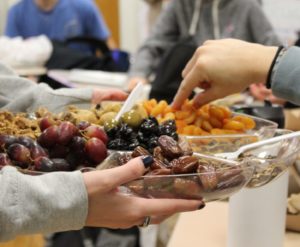
Dear Miriam,
I coordinate a lot of meal trains for various Jewish communities I am involved in and have been doing this for about a decade. I know it’s kind of a stereotype, but it’s also true that Jews show their love with food, so when someone has a baby, a loss, a surgery, an illness, moves into a new home, etc., I try to make sure they are taken care of with a meal.
I have also observed that 90-95% of the time, women are the ones who sign up to bring a meal (whether it’s homemade or takeout). In these same communities, I typically do not see disparity in any other activities based on gender.
So, my question is, how do I get more males involved in signing up for meal trains? I truly believe acts of kindness are a choice, and I don’t want to force anyone into it, but I really want to know how to get the other 50% of the population involved.
Signed,
Meals for (and from) All
Dear Meals,
Feeding people during times of need isn’t just a Jewish stereotype; it’s also a mitzvah, a commandment, an important part of what it means to be in community with other people. I don’t remember a lot from when I had newborns, but I do remember the delicious food that arrived at our home day after day and sustained us through those early weeks.
Providing meals to someone specifically fits under the mitzvah of gemilut chasidim, acts of lovingkindness. Sure, a meal train fulfills an important need of providing physical sustenance to someone during trying times, but you can also view these meals as fulfilling the spiritual needs of the person providing the food. Simply, it is good for you to do good for others.
You, presumably, know all this, since meal trains have been an important part of your life and the way in which you interact with your communities. But have you communicated these details to other people? Typically, a meal train introduction explains how many people you’re feeding, where and when to deliver the meal, and any food preferences or allergies. Maybe it’s time to consider adding a line about why providing a meal is a mitzvah, a true Jewish obligation. While that angle won’t speak to everyone, it may inspire more people, and possibly different people, to sign up.
Still, food preparation and the emotional energy involved in signing up, cooking (or ordering) and delivering a meal are often seen as women’s territory and, as you’ve seen, this plays out even in progressive communities. This disparity is rooted in the fact that women are typically tasked with roles that can be described as “emotional labor.” Meal trains, while beautiful, important and necessary, also involve a great deal of emotional labor.
You can take on the additional emotional work of reaching out to individual male-identified people and personally inviting them to contribute to a meal train. In the short term, you can talk to other female-identified people in your community to ask them what they think about this disparity and, if they have male partners, if they have ideas for getting them more involved in this mitzvah of kindness.
In the long-term, all of our communities need to change the way gender impacts who is expected to take on what kinds of roles and responsibilities. Until the time when these gender disparities disappear, I’ll go ahead and thank you for continuing to do what you’re doing. Through all these meal trains, as well as thinking about how to make them more equitable, you really are providing an incredible service to your community.
Be well,
Miriam



